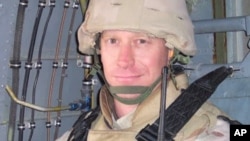Top U.S. military officials have urged the Senate to vote to repeal the law banning homosexuals from serving openly in the armed forces. The call follows this week's release of a Pentagon report showing most troops have few, if any, objections to serving with a gay colleague, and that the policy can be changed with low risk of harm to the military.
Applauding the study's findings are thousands of gay former service members discharged under the policy known as "Don't Ask, Don't Tell."
After the U.S.-led invasion of Iraq, then-Air Force Major Mike Almy led a squadron of military air traffic controllers.
"We controlled the airspace over the vast majority of Iraq," said Almy.
But Almy had a secret: he is gay.
"I had to lie every day about who I was. I couldn't be honest about who I was with my squadron," he recalled. "While I was in Iraq, I wrote private e-mails to friends and family, and to the guy I was dating at the time."
The military accessed Almy's e-mail account, and accused him of violating the military policy on homosexuality, called "Don't Ask, Don't Tell."
"I never told. The Air Force asked," added Almy.
Almy was honorably discharged in 2006.
"I felt like my country had betrayed me," he said. "Here I had volunteered to put myself in harm's way, loved the military, had dedicated my entire adult life to serving my country. And then coming back from a combat zone, this was the gratitude, the thanks from my nation, to throw me to the curb like a common criminal."
Almy is one of 14,000 military personnel targeted under "Don't Ask, Don't Tell."
This week, the Pentagon released a report on military attitudes towards a potential repeal of the law, and how to allow openly-gay military service without harming the armed forces. Pentagon officials presented the findings to the Senate Armed Services Committee.
"A strong majority of those who answered the survey, more than two-thirds, do not object to gays and lesbians serving openly in uniform," noted Defense Secretary Robert Gates.
The Chairman of the Joint Chiefs of Staff, Admiral Michael Mullen, shares that viewpoint.
"Repeal of the law governing 'Don't Ask, Don't Tell' is the right thing to do... Repeal of the law will not prove an unacceptable risk to military readiness. I believe our troops and their families are ready for this."
But both Gates and Mullen admitted that pockets of resistance to repeal do exist in the military, especially in combat units, and that thorough and careful preparation will be required to successfully change the policy.
Republican Senator John McCain has used procedural motions to block Senate consideration of repeal.
"We should be inherently cautious about making any changes that would affect our military, and what changes we do make should be the product of careful and deliberate consideration," said McCain.
Defenders of "Don't Ask, Don't Tell" accuse the Pentagon study of deliberately downplaying troops' concerns about serving with openly-gay colleagues.
"What kind of study is that, where you conduct interviews, get input from people: ground soldiers, sailors, airmen, and marines and then conclude 'we don't care about those [opinions]; they are exaggerated'? These are the people that know [about military conditions], and they are expressing very real concerns," said Retired Army Colonel Dick Black.
The Pentagon study predicts concerns and objections will wane. The House of Representatives has voted to repeal "Don't Ask, Don't Tell" Action is far from assured in the Senate, where Republicans have threatened to block end-of-year legislation. If the law is repealed, Mike Almy hopes to rejoin the Air Force.
"All I have ever wanted to do is just serve my country. This is the only law we have on the books in America that mandates firing people solely because of who they are," said Almy.













